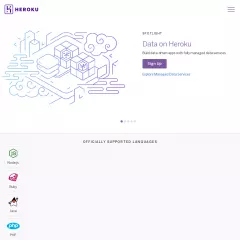
Heroku is a cloud-based platform as a service (PaaS) that allows developers to build, deploy, and scale web applications with ease. It provides a streamlined and intuitive development environment that eliminates the need for infrastructure management, allowing developers to focus on writing code and delivering applications.
Key features and capabilities of Heroku include:
Application Deployment: Heroku simplifies the process of deploying web applications. Developers can easily deploy their code by pushing it to a Git repository or using a continuous integration/continuous deployment (CI/CD) pipeline. Heroku takes care of the underlying infrastructure and automatically provisions and scales the necessary resources.
Multiple Programming Languages: Heroku supports several popular programming languages, including Node.js, Ruby, Python, Java, PHP, Go, and more. This allows developers to choose their preferred language for building their applications.
Scalability and Performance: Heroku provides horizontal scalability, allowing applications to handle increased traffic and load. It automatically scales the application by provisioning additional dynos (containers) based on demand. Heroku also offers performance monitoring tools to help developers optimize their application's performance.
Add-ons and Integrations: Heroku offers a marketplace of add-ons and integrations that developers can use to enhance their applications. These add-ons include databases, caching services, logging services, monitoring tools, and more. Integrating these add-ons is seamless, as Heroku manages the provisioning and configuration.
Collaboration and Teamwork: Heroku supports collaboration among team members by providing features for version control, deployment pipelines, and access controls. Multiple developers can work on the same application simultaneously and collaborate using tools like Git.
Logging and Monitoring: Heroku provides logging functionality to track application events and diagnose issues. It integrates with popular logging services, making it easier to monitor application performance and troubleshoot problems.
Database Management: Heroku offers various managed database services, including PostgreSQL, MySQL, MongoDB, and more. These databases are fully managed, meaning Heroku takes care of backups, scaling, and maintenance.
Heroku CLI and API: Heroku provides a command-line interface (CLI) and a RESTful API, allowing developers to interact with the platform programmatically. This enables automation, integration with other tools, and the ability to manage Heroku resources from the command line.
Heroku is widely used by developers and small to medium-sized businesses for its simplicity, flexibility, and scalability. It abstracts away the complexities of infrastructure management and allows developers to focus on building and deploying their applications quickly and efficiently.
Key features and capabilities of Heroku include:
Application Deployment: Heroku simplifies the process of deploying web applications. Developers can easily deploy their code by pushing it to a Git repository or using a continuous integration/continuous deployment (CI/CD) pipeline. Heroku takes care of the underlying infrastructure and automatically provisions and scales the necessary resources.
Multiple Programming Languages: Heroku supports several popular programming languages, including Node.js, Ruby, Python, Java, PHP, Go, and more. This allows developers to choose their preferred language for building their applications.
Scalability and Performance: Heroku provides horizontal scalability, allowing applications to handle increased traffic and load. It automatically scales the application by provisioning additional dynos (containers) based on demand. Heroku also offers performance monitoring tools to help developers optimize their application's performance.
Add-ons and Integrations: Heroku offers a marketplace of add-ons and integrations that developers can use to enhance their applications. These add-ons include databases, caching services, logging services, monitoring tools, and more. Integrating these add-ons is seamless, as Heroku manages the provisioning and configuration.
Collaboration and Teamwork: Heroku supports collaboration among team members by providing features for version control, deployment pipelines, and access controls. Multiple developers can work on the same application simultaneously and collaborate using tools like Git.
Logging and Monitoring: Heroku provides logging functionality to track application events and diagnose issues. It integrates with popular logging services, making it easier to monitor application performance and troubleshoot problems.
Database Management: Heroku offers various managed database services, including PostgreSQL, MySQL, MongoDB, and more. These databases are fully managed, meaning Heroku takes care of backups, scaling, and maintenance.
Heroku CLI and API: Heroku provides a command-line interface (CLI) and a RESTful API, allowing developers to interact with the platform programmatically. This enables automation, integration with other tools, and the ability to manage Heroku resources from the command line.
Heroku is widely used by developers and small to medium-sized businesses for its simplicity, flexibility, and scalability. It abstracts away the complexities of infrastructure management and allows developers to focus on building and deploying their applications quickly and efficiently.